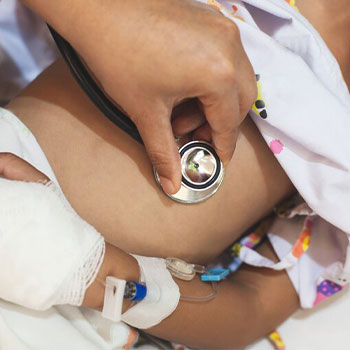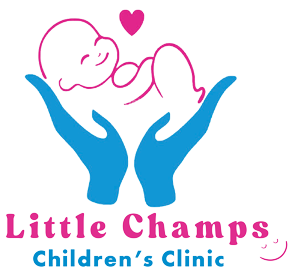What is a pediatric emergency?
A pediatric emergency refers to any sudden medical condition or injury that requires immediate attention and intervention in children from infancy to adolescence. Due to their developing immune systems and growing bodies, children are more susceptible to various health issues, which makes timely treatment crucial. Pediatric emergencies can range from severe infections, respiratory problems, and injuries to sudden allergic reactions, seizures, and accidents.
The key distinction of pediatric emergency care lies in its approach. Children require specialized care tailored to their age, size, and developmental needs. As a result, pediatric emergency care demands experienced pediatricians in Vijayawada who understand the unique aspects of children’s health, growth, and emotional requirements.

What are the types of pediatric emergencies?
Pediatric emergencies can arise from various conditions, each presenting its own set of symptoms and treatment needs. Below are the most common types of pediatric emergencies.
- Respiratory distress and asthma attacks: it's one of the most frequent reasons for children needing emergency care. Conditions like asthma, bronchiolitis, pneumonia, and croup can cause breathing difficulties. Quick intervention, such as oxygen therapy or medications, can be lifesaving.
- Severe allergic reactions(anaphylaxis): anaphylaxis is a life-threatening allergic reaction to food, medications, or insect stings. Symptoms include difficulty breathing, swelling, and shock. Immediate treatment with epinephrine is necessary.
- Seizures and neurological issues: fever, epilepsy, infections, or head injuries can cause seizures. Children experiencing seizures require prompt attention to prevent brain damage or other complications.
- Injuries and trauma: accidents and injuries, such as fractures, cuts, burns, and head injuries, are common in children. While some are minor, others like concussions or internal bleeding need urgent evaluation and treatment.
- Dehydration and gastrointestinal issues: diarrhea, vomiting, and poor fluid intake can lead to severe dehydration in children. Immediate fluid replacement may be required in the emergency room to prevent complications like shock or organ damage.
- Poisoning: ingestion of household substances, chemicals, or medications can be dangerous and requires immediate treatment to prevent toxic effects.
- High fevers: persistent high fevers in young children can indicate serious infections, such as meningitis, and may require hospital care.
- Cardiac emergencies: while rare, congenital heart defects or rhythm abnormalities can cause sudden cardiac emergencies in children. Rapid diagnosis and intervention are critical to preserving life.
- Drowning or near-drowning incidents: quick resuscitation is essential to prevent brain damage and death in drowning cases.
- Sepsis: sepsis is a dangerous infection that can spread rapidly throughout the body, leading to organ failure if untreated. Children with compromised immune systems are particularly at risk.
What are the best treatment options for pediatric emergencies?
The treatment approach for pediatric emergencies depends on the condition and its severity. Below are some of the most common treatments used in pediatric emergency care.
- Respiratory support: for conditions like asthma attacks or severe respiratory distress, oxygen therapy, nebulizers, and bronchodilators are used. In more severe cases, mechanical ventilation may be required.
- Epinephrine for anaphylaxis: epinephrine injections are the first line of treatment for anaphylaxis. Following this, close monitoring, antihistamines, and steroids are used to stabilize the child.
- Anticonvulsant medications: children experiencing seizures are administered anticonvulsant medications such as diazepam or lorazepam to control the seizure activity.
- Intravenous (IV) fluids for dehydration: in cases of severe dehydration, IV fluids are administered to restore hydration and electrolyte balance.
- Fracture care and splinting: broken bones are stabilized with splints or casts. In severe cases, surgery may be required to realign the bones.
- Antibiotics for infections: in cases of severe bacterial infections, IV antibiotics are administered to control the infection.
- Defibrillation or cardiac resuscitation: in cardiac emergencies, defibrillation or CPR may be necessary to restore heart function.
- Toxin removal in poisoning: depending on the substance ingested, treatments can include activated charcoal, stomach pumping, or antidotes to neutralize the poison.
- Fever management: High fevers are managed with antipyretics such as acetaminophen or ibuprofen. In cases of fever-induced seizures, anticonvulsants may also be used.
- Sepsis management: children with sepsis receive aggressive IV fluids, antibiotics, and possibly vasopressors to maintain blood pressure.
Benefits of pediatric emergency care at Little Champs Children’s Clinic
1. Specialized pediatric care: we are fully equipped with modern medical technology and experienced pediatricians to provide specialized children's care in emergencies. The clinic offers a child-friendly environment, ensuring children feel safe and comfortable during treatment.
2. Expert emergency care by the best children's doctor in Vijayawada: Dr. Anusha chalasani is a highly qualified and experienced pediatrician, renowned for her expertise in pediatric emergency care. Her prompt and precise interventions have made her one of the best paediatric emergency doctors in vijayawada.
3.Comprehensive emergency services: the clinic provides comprehensive care for a wide range of pediatric emergencies, from injuries to severe infections, ensuring that all emergency needs are met under one roof.
4. Rapid response and quick diagnosis: speed is critical in emergencies, and the team at Little Champs is trained to respond quickly, with precise diagnostics to determine the best course of treatment.
5. Parent involvement and guidance: the clinic emphasizes educating parents on emergency care, guiding them on how to handle emergencies at home, and offering detailed instructions on follow-up care.
Choosing the right facility for pediatric emergency care is crucial. We stand out as one of the top children's clinics in vijayawada for several reasons.
- Dedicated pediatric emergency unit: the clinic has a dedicated emergency unit specially designed for children, ensuring they receive the most appropriate and timely care.
- Best children’s emergency doctor in Vijayawada: Dr. Anusha has years of experience in handling pediatric emergencies. Her expertise, compassion, and dedication to her young patients make her one of the top choices for parents.
- State-of-the-art facilities: the clinic is equipped with the latest medical technologies, ensuring that diagnostic tests and treatments can be administered efficiently in critical moments.
- Child-centered approach: understanding that children’s needs differ from adults, the clinic focuses on creating a calming, child-friendly environment to reduce the stress and fear that often accompany emergency visits.
Pediatric emergencies can be frightening and overwhelming for both the child and their parents. Recognizing the early signs of an emergency and seeking prompt medical attention is crucial to ensuring the best possible outcome for the child. Whether it’s a respiratory issue, an allergic reaction, or an injury, we are fully prepared to provide the highest standard of care, ensuring that children in need receive prompt, expert, and compassionate treatment.
